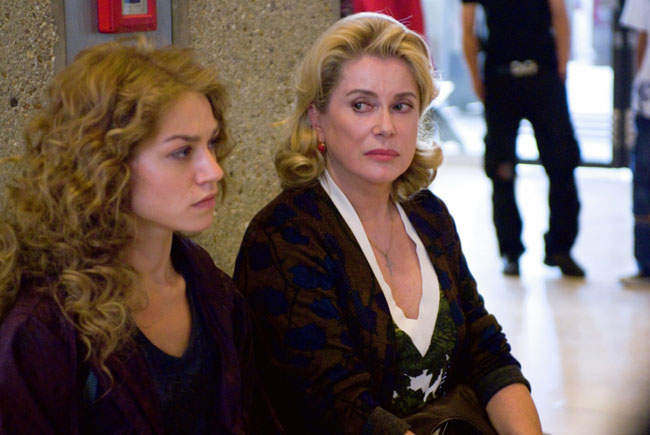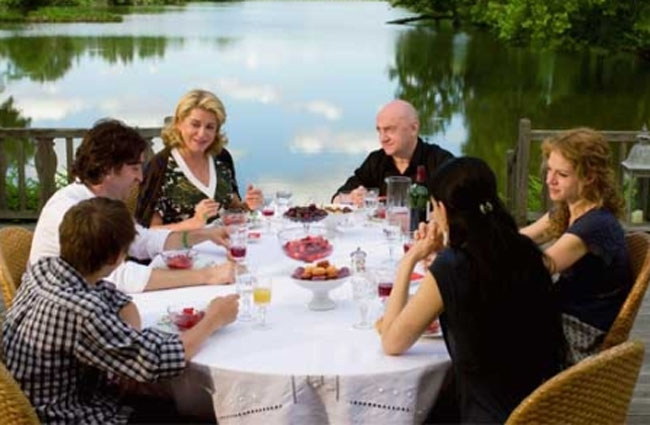CHICAGO – In anticipation of the scariest week of the year, HollywoodChicago.com launches its 2024 Movie Gifts series, which will suggest DVDs and collections for holiday giving.
‘The Girl on the Train’ Favors Character Study Over Social Commentary
 Rating: 3.5/5.0 |
CHICAGO – Here’s a film that pulls off the tricky feat of moving quickly while taking its time. Like its rollerblading protagonist, “The Girl on the Train” is constantly on the move, hurtling headfirst into a series of interlocking relationships. Yet the director, André Téchiné, is less interested in his story’s destination than he is with the journey his characters take, and the various circumstances that lead them to make life-altering, often inexplicable choices.
With a career spanning over thirty years, Téchiné has truly emerged as one of France’s most gifted filmmakers. His storytelling approach has always been more poetic than plot-driven, and his latest work is no exception. Any moviegoer expecting “Girl on the Train” to be a penetrating examination of the real-life incident at its core will be disappointed. The film is an adaptation of Jean-Marie Besset’s play, which was inspired by a 2004 media storm centering on a young Gentile woman’s claim that she had been the victim of an anti-Semitic attack. Since several similar crimes had recently occurred, the public easily accepted her story. Then it turned out to be false.
Though Téchiné utilizes a rather theatrical two-act structure, his film is not at all like a claustrophobic, dialogue-heavy social commentary in the vein of Stanley Kramer. The central “incident” doesn’t occur until late into the picture, and initially seems to come out of nowhere, as the impulsive twenty-one-year-old Jeanne (Émilie Dequenne) once again allows her actions to be guided by her instincts rather than her head. Jeanne may have been an insufferable character if she hadn’t been played by an actress as radiant and hypnotic as Dequenne, who has a face that Kuleshov would’ve loved.
 Photo Credit: © Strand Releasing |
She played an equally impetuous heroine in the Dardenne brothers’ 1999 film “Rosetta,” which garnered Dequenne the Best Actress award at Cannes. Her enigmatic expressions allow the audience to read a great deal into them, and in “Girl on the Train,” her face becomes an object of fascination, as Téchiné attempts to understand what motivated her to do what she did. Though the script, co-authored by Téchiné, Besset and Odile Barski, offers a few vague (and oddly simplistic) explanations, it’s clear that no answer can encapsulate the mystery of her actions.
The first hour of “Girl on the Train” is certainly its strongest, as it follows Jeanne on her rollerblades; her aimless movement is reminiscent of Dustin Hoffman’s ride on the airport conveyor belt in “The Graduate.” She eventually collides with Franck (Nicolas Duvauchelle), an aspiring wrestler who doubles as a smooth-talking con-artist. His character is established in a delightfully written and acted scene where he uses his suave negotiating skills to help Jeanne purchase a bag for thirty euros instead of fifty.
As Jeanne begins to fall for his slick charm, her widowed mother, Louise (Catherine Deneuve), begins to reconnect with her former beau, Samuel (Michel Blanc), who’s now a famous lawyer and Jewish activist. Skeptical of her unemployed daughter’s new flame, Louise tries to land Jeanne a job with Samuel, yet the two infatuated lovers have other plans, and decide to move in together. This section of the film has the driving momentum of a locomotive, thanks to Téchiné’s exuberant direction, Julien Hirsch’s beguiling cinematography, and Philippe Sarde’s tension-building score.
 Photo Credit: © Strand Releasing |
Yet the film derails whenever its attention diverts toward parallel subplots involving Samuel’s moody son, Alex (Mathieu Demy), who spars with his Israeli ex-wife (Ronit Elkabetz), while attempting to connect with his own weary son, Nathan (Jérémy Quaegebeur). Though each of the characters are well portrayed, and could easily populate an entirely separate picture, their scenes never really coalesce with the primary action. And when Téchiné attempts to thematically connect them toward the end, his efforts feel forced, though he does find intriguing ways to visually parallel the psyches of Nathan and Jeanne (particularly in a key shot where the boy tries out his father’s razor).
“The Girl on the Train” is not quite as satisfying as Téchiné’s last drama, “The Witnesses,” nor his last collaboration with Deneuve, “Changing Times,” which featured a truly sublime reunion between old flames. While both of those previous pictures benefitted from Téchiné’s unwavering focus, this film is ultimately too preoccupied with its overabundance of character portraits, thus causing its lead character to become somewhat lost in the shuffle toward the end. After being swept up in the film’s tireless pace, viewers may become perplexed at the end, wondering where exactly they’ve arrived.
 | By MATT FAGERHOLM |


